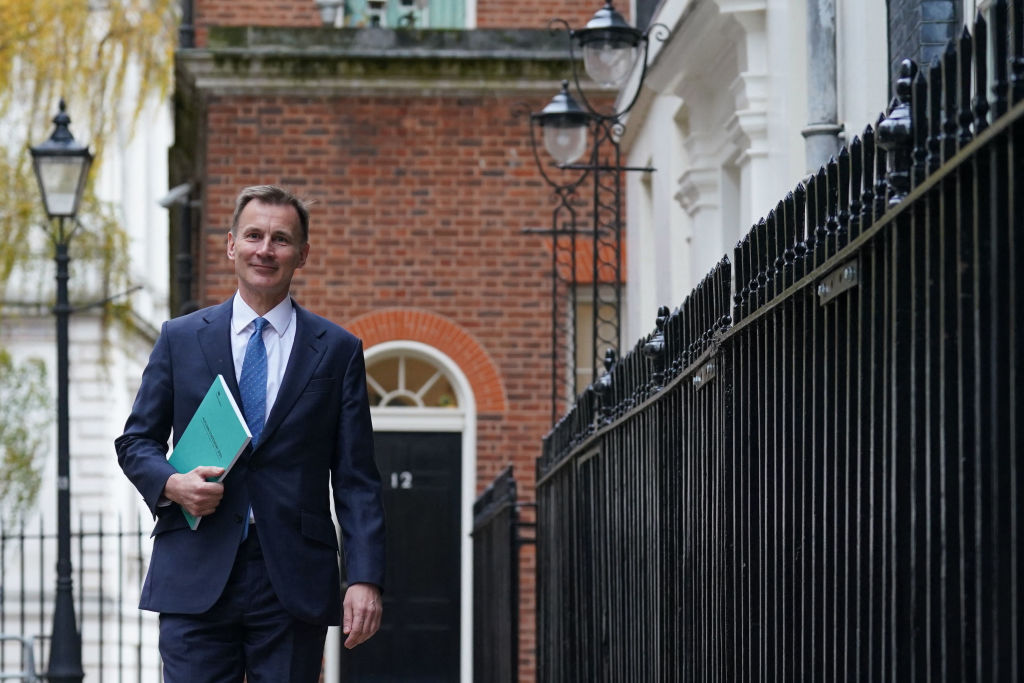There were few surprises when Jeremy Hunt presented his second Autumn Statement to the House of Commons this afternoon: National Insurance has been cut and the state pension and benefits will rise. The Chancellor is hoping that these measures will woo voters ahead of next year’s election. But while Hunt tried to paint an image of the economy being back on track, there were some nasty surprises in the updated forecasts released by the Office for Budget Responsibility (OBR). Although growth has been revised up this year to 0.6 per cent, it has been downgraded for the following three years, rising to 2 per cent in 2027. Inflation is meanwhile forecast to drop to 2.8 per cent by the end of 2024, down from 4.6 per cent recorded in October.
Hunt’s opposite number Rachel Reeves responded by claiming that the Conservatives have ‘held back growth, they have crashed our economy, increased debt, trashed our public services, left businesses out in the cold, and made life harder for working people’. ‘Does anything in Britain work better today than when the Conservatives came into office 13 years ago?’ she asked, concluding with the words ‘It is time for change.’
Below are the major changes from Hunt’s statement:
Taxes
Hunt announced the abolition of class 2 National Insurance, which is paid by the self-employed. Combined with a reduction in the rate of class 4 National Insurance from 9 per cent to 8 per cent, this is expected to save self-employed workers £350.
Full-expensing has also being made permanent, with Hunt dubbing it ‘the largest business tax cut in modern British history’. He estimated that this will increase business investment by £20 billion a year – almost 1 per cent of GDP. The 75 per cent business rates discount for hospitality, retail and leisure has been extended for another year, at a cost of £4.3 billion.
Alcohol duty will be frozen on all drinks until August next year. But hand-rolling tobacco duty will be hiked by more than 10 per cent.
Benefits
Benefits will increase by 6.7 per cent, in line with September’s inflation figure. But from April next year the state pension will go up by 8.5 per cent – which will be worth up to £900 a year. Housing allowance will be ‘unfrozen’ and increased to give 1.6 million people an extra £800 next year.
The Chancellor confirmed that people with mobility and mental health problems face their benefits slashed if they fail to look for jobs they can do from home. Existing claimants will also get assurances that their right to benefits will not be reassessed if they look for a work-from-home job. Changes to the work capability assessment have also been announced following a consultation, with stricter rules to be introduced.
Spending
A further £1 billion has been announced for Levelling Up, with £80 million for projects in Scotland, Wales and Northern Ireland. Households living close to new pylons and electricity substations will receive up to £1,000 a year off energy bills for a decade. Other commitments include an additional £10 million for veterans’ mental health services and £7 million over the next three years to organisations like the Community Security Trust to tackle antisemitism.
Planning
From next year, councils will be able to recover the full costs of planning applications – provided they meet prompt deadlines. Ministers will also consult on a law to allow any house to be converted into two flats, provided the exterior is respected.
Employment
The National Living Wage will increase by over a pound an hour from April, from £10.42 to £11.44. The hike means a full-time worker could receive a pay rise of more than £1,800 a year. Hunt also said the National Minimum wage rates for younger workers will also increase, with 18-20 year-olds getting a wage boost to £8.60 an hour.
The minimum hourly wage for an apprentice will be increased by 21 per cent to £6.40 an hour from next year. Some £50 million has been set aside to boost the number of apprentices in engineering over the next two years.
Other
There will be changes to the rules for pension funds, with workers given the right to require new employers to pay pension money into an existing pension pot. Hunt is also exploring the options for selling off the government’s remaining shares in NatWest.







Comments